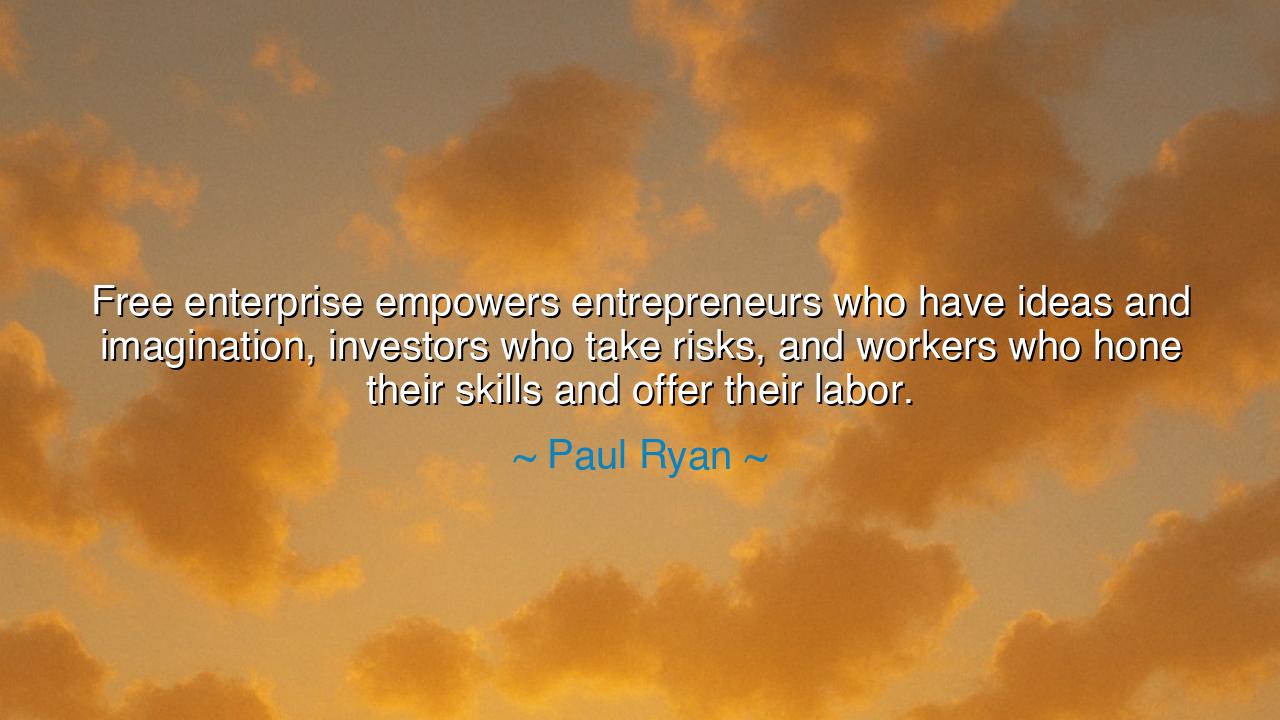
Free enterprise empowers entrepreneurs who have ideas and
Free enterprise empowers entrepreneurs who have ideas and imagination, investors who take risks, and workers who hone their skills and offer their labor.






“Free enterprise empowers entrepreneurs who have ideas and imagination, investors who take risks, and workers who hone their skills and offer their labor,” declared Paul Ryan, a voice from the modern age speaking a truth that echoes through the chambers of history. His words remind us that the strength of civilization is not born from decree or command, but from the freedom of human energy — the liberty of the mind to imagine, the courage of the heart to risk, and the discipline of the hands to labor. In this sacred trinity of imagination, risk, and work, Ryan captures the essence of the system we call free enterprise — not merely an economic design, but a moral and creative force that honors the dignity of effort and the boundless potential of human invention.
The origin of this idea reaches far beyond modern markets, deep into the very roots of human progress. From the first merchants who bartered in ancient bazaars to the explorers who sailed into uncharted seas, it was always freedom — not compulsion — that sparked the fire of advancement. When the chains of control are loosened, and men and women are permitted to act upon their ideas and imagination, entire worlds are transformed. Ryan’s words remind us that free enterprise is, at its heart, the economic expression of a deeper truth: that human creativity flourishes best when it is free.
In every age, the progress of mankind has depended upon those who dared to dream and to build. The entrepreneur, in Ryan’s vision, is the heir to the ancient craftsman and the modern innovator alike. Such a person sees not only what is, but what could be — and by imagination turns vision into reality. Yet imagination alone is not enough; it must be joined with courage. For the investor, as Ryan describes, embodies the spirit of risk — the willingness to place faith, capital, and fortune in the uncertain pursuit of greatness. And at the foundation of all, the worker lends his strength and skill, transforming both idea and investment into tangible creation. Thus, the free market is not a contest of greed, but a symphony of purpose — where each role, noble in its own right, contributes to the greater harmony of prosperity.
History gives us many examples of this power. Consider the story of Andrew Carnegie, who rose from the poverty of a Scottish weaver’s son to become one of the greatest builders of the modern world. Through his imagination, he envisioned bridges and railways that would unite a continent. Through his risk, he staked his future on the promise of steel. And through the labor of thousands, his dream took form — not without hardship, but with enduring consequence. His life illustrates the truth that Ryan extols: that when enterprise is free, it becomes the engine by which the humble may rise, and the whole of society may advance.
Yet Ryan’s wisdom also carries a warning: that such empowerment demands virtue. Freedom without responsibility becomes chaos, and enterprise without compassion becomes exploitation. True free enterprise thrives not through domination, but through cooperation. It depends upon trust — that the entrepreneur will create with integrity, that the investor will risk with vision, and that the worker will labor with pride. When these elements align, a nation’s wealth is not measured merely in gold, but in opportunity — in the number of lives lifted and dreams fulfilled.
The imagination, as Ryan names it, is the soul of this system, for it is imagination that drives innovation. Without it, the world stagnates; with it, every limit is challenged. The risk-taker brings motion to this vision, breathing courage into creation. The worker, with skill and endurance, completes the cycle, grounding ideals in reality. Together, they form the triad upon which civilization stands. Thus, free enterprise is not simply an economic policy, but a celebration of human capacity, the faith that given freedom, mankind will strive not only for profit, but for progress.
So let this be the lesson for all who hear: cherish the freedom that allows your imagination to soar, but bind it with discipline. Honor the courage of the risk-taker, but temper it with wisdom. Respect the dignity of labor, for it is the foundation of all creation. Do not fear the trials that come with liberty, for they are the price of greatness. As Paul Ryan’s words remind us, when free men and women work, dream, and risk together, they build not only wealth, but a world that reflects the highest expression of the human spirit — a world where the enterprise of the free becomes the triumph of the whole.






AAdministratorAdministrator
Welcome, honored guests. Please leave a comment, we will respond soon